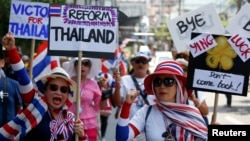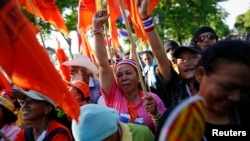BANGKOK —
Thailand’s former prime minister Yingluck Shinawatra has been found guilty of negligence by an anti-corruption commission, which could lead to a five-year ban from politics. Yingluck was ousted from office Wednesday after another court found her and other top ministers guilty of abuse of power charges.
Thailand’s anti-corruption commission said Thursday it had found grounds for Yingluck Shinawatra’s impeachment, holding her responsible for a bungled rice-pledging program that paid farmers a fixed price for their crops.
Senate to vote on impeachment
Her case now goes to the Senate. If impeached, Yingluck would be barred from politics for five years. But political observers say she may have enough support in the Senate to prevent the chamber from mustering the three-fifths needed for impeachment.
The anti-corruption commission unanimously found Yingluck guilty of dereliction of duty for failing, as head of the National Rice Policy Committee, to respond to corruption in the subsidy scheme. The commission is still investigating whether she should face criminal charges in the matter.
Thursday’s ruling echoes language used by the Constitutional Court Wednesday when it ordered her removed from office for the inappropriate transfer of the national security chief.
For her supporters, the court’s and the commission’s rulings are evidence of what they term a “judicial coup” against Yingluck and her family’s political infrastructure, which has won every general election since 2001.
Many in Thailand worry the months-long struggle between pro- and anti-government factions could devolve into further violence if both sides cannot reach consensus.
Police Lt. Col. Kritsana Pattanacharoen, a spokesman for the Center for the Administration of Peace and Order (CAPO), on Thursday noted fresh violence in Bangkok since Wednesday’s ouster of the prime minister.
“CAPO wishes to reaffirm that the court’s judgment will lead to violence as seen from a series of incidents including the firing of M-79 grenades targeting Chulabhorn Hospital, some commercial bank headquarters and also the residence of the Constitutional Court’s judge,” stated Kritsana.
CAPO also is warning leaders of pro- and anti-government movements against any violence during their dueling demonstrations in the capital in the days ahead.
In recent months, pro-government demonstrators known as “red shirts” have largely stayed away from the capital to avoid direct confrontations with anti-government groups concentrated in Bangkok. Analysts worry that the moves against Yingluck and members of her party could lead supporters to stage more aggressive demonstrations near the capital, leading to clashes with opponents.
Two shots were reportedly fired in the direction of anti-government demonstrators as they began a march from a central Bangkok park on Thursday. No one was injured.
The roots of the current political turmoil go back to 2006, when protests against billionaire businessman turned politician Thaksin Shinawatra led to a coup ousting him as prime minister. Yingluck, elected in 2011, is Thaksin’s younger sister.
Caretaker PM replaces Yingluck
Government opponents see the acting prime minister, selected Wednesday by his fellow Cabinet members, as another politician controlled by Thaksin. Niwattumrong Boongsongpaisan, the commerce minister in Yingluck’s cabinet, was a business executive in the Shinawatra empire before joining politics several years ago.
The United States government has avoided taking sides in the polarized political atmosphere in Thailand, a key regional ally with a long-standing military partnership.
A State Department spokesperson said “a resolution should include elections and an elected government” and the U.S. urged “all sides to exercise restraint and reaffirm that violence is not an acceptable means of resolving political differences."
The election commission has proposed polls for July 20 after February voting was scuttled by anti-government protestors. But the continuing political chaos has thrown in doubt whether elections can be held then.
Interim deputy prime minister Pongthep Thepkanjana, who is also the justice minister, said the caretaker government is working under the election commission’s framework.
Pongthep said a meeting between the government and the commission should be held next Monday because if arrangements are not in place by May 14 then it will be difficult to have the election on July 20 as anticipated.
But an election commissioner said it is unclear whether the interim cabinet, after the departure of Yingluck, has the authority to submit a petition for a royal decree needed to officially set the polling.
Thailand’s anti-corruption commission said Thursday it had found grounds for Yingluck Shinawatra’s impeachment, holding her responsible for a bungled rice-pledging program that paid farmers a fixed price for their crops.
Senate to vote on impeachment
Her case now goes to the Senate. If impeached, Yingluck would be barred from politics for five years. But political observers say she may have enough support in the Senate to prevent the chamber from mustering the three-fifths needed for impeachment.
The anti-corruption commission unanimously found Yingluck guilty of dereliction of duty for failing, as head of the National Rice Policy Committee, to respond to corruption in the subsidy scheme. The commission is still investigating whether she should face criminal charges in the matter.
Thursday’s ruling echoes language used by the Constitutional Court Wednesday when it ordered her removed from office for the inappropriate transfer of the national security chief.
For her supporters, the court’s and the commission’s rulings are evidence of what they term a “judicial coup” against Yingluck and her family’s political infrastructure, which has won every general election since 2001.
Many in Thailand worry the months-long struggle between pro- and anti-government factions could devolve into further violence if both sides cannot reach consensus.
Police Lt. Col. Kritsana Pattanacharoen, a spokesman for the Center for the Administration of Peace and Order (CAPO), on Thursday noted fresh violence in Bangkok since Wednesday’s ouster of the prime minister.
“CAPO wishes to reaffirm that the court’s judgment will lead to violence as seen from a series of incidents including the firing of M-79 grenades targeting Chulabhorn Hospital, some commercial bank headquarters and also the residence of the Constitutional Court’s judge,” stated Kritsana.
CAPO also is warning leaders of pro- and anti-government movements against any violence during their dueling demonstrations in the capital in the days ahead.
In recent months, pro-government demonstrators known as “red shirts” have largely stayed away from the capital to avoid direct confrontations with anti-government groups concentrated in Bangkok. Analysts worry that the moves against Yingluck and members of her party could lead supporters to stage more aggressive demonstrations near the capital, leading to clashes with opponents.
Two shots were reportedly fired in the direction of anti-government demonstrators as they began a march from a central Bangkok park on Thursday. No one was injured.
The roots of the current political turmoil go back to 2006, when protests against billionaire businessman turned politician Thaksin Shinawatra led to a coup ousting him as prime minister. Yingluck, elected in 2011, is Thaksin’s younger sister.
Caretaker PM replaces Yingluck
Government opponents see the acting prime minister, selected Wednesday by his fellow Cabinet members, as another politician controlled by Thaksin. Niwattumrong Boongsongpaisan, the commerce minister in Yingluck’s cabinet, was a business executive in the Shinawatra empire before joining politics several years ago.
The United States government has avoided taking sides in the polarized political atmosphere in Thailand, a key regional ally with a long-standing military partnership.
A State Department spokesperson said “a resolution should include elections and an elected government” and the U.S. urged “all sides to exercise restraint and reaffirm that violence is not an acceptable means of resolving political differences."
The election commission has proposed polls for July 20 after February voting was scuttled by anti-government protestors. But the continuing political chaos has thrown in doubt whether elections can be held then.
Interim deputy prime minister Pongthep Thepkanjana, who is also the justice minister, said the caretaker government is working under the election commission’s framework.
Pongthep said a meeting between the government and the commission should be held next Monday because if arrangements are not in place by May 14 then it will be difficult to have the election on July 20 as anticipated.
But an election commissioner said it is unclear whether the interim cabinet, after the departure of Yingluck, has the authority to submit a petition for a royal decree needed to officially set the polling.






